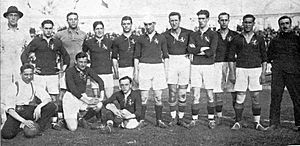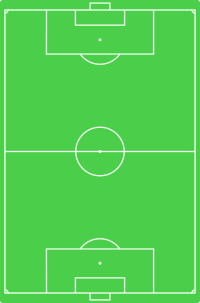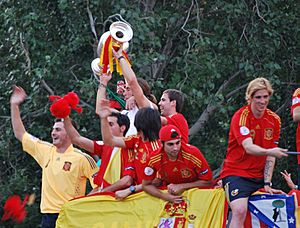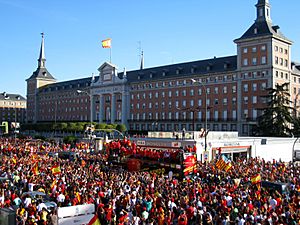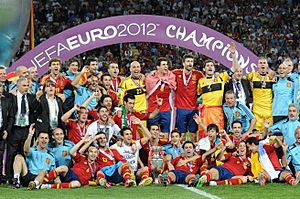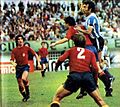History of the Spain national football team facts for kids
| Nickname(s) |
|
|---|---|
| Association | Real Federación Española de Fútbol (RFEF) |
| Confederation | UEFA (Europe) |
| Most caps | Sergio Ramos (180) |
| Top scorer | David Villa (59) |
| FIFA ranking | |
| Highest | 1 (July 2008 – June 2009, October 2009 – March 2010, July 2010 – July 2011, October 2011 – July 2014) |
| Lowest | 25 (March 1998) |
| First international | |
(Brussels, Belgium; 28 August 1920) |
|
| World Cup | |
| Appearances | 16 (first in 1934) |
| Best result | Champions (2010) |
| European Championship | |
| Appearances | 12 (first in 1964) |
| Best result | Champions (1964, 2008, and 2012) |
The history of the Spain national football team tells the story of Spain's national football (soccer) team, often called La Furia Roja (The Red Fury). The team first played in 1920 and has since become one of the best in the world. Their biggest success was winning the 2010 FIFA World Cup.
Contents
Early Days and First Wins
Starting Out: 1920 Olympics
The first official Spain national football team was created in 1920. Their main goal was to represent Spain at the 1920 Summer Olympics in Belgium.
Spain played their first official game on August 28, 1920, against Denmark. Spain won 1–0 with a goal from Patricio Arabolaza. This made Spain the 28th country to play an international football match. They later lost to the host country, Belgium, by a score of 3–1.
Because of some rules and disqualifications, Spain got another chance to play for a medal. They beat Sweden 2–1 and then Italy 2–0. In the final match of this special tournament, Spain defeated the Netherlands 3–1. This amazing win earned Spain the silver medal at the Olympics, their first international trophy!
The team that won the silver medal included players like Ricardo Zamora and Pichichi. Even though it was a great start, it took many years for Spain to achieve such success again. In 1929, Spain became the first team from mainland Europe to beat England, winning 4–3.
1950 World Cup Journey
After a break due to the Spanish Civil War and World War II, Spain returned to play in the 1950 FIFA World Cup in Brazil. They beat Portugal to qualify. In Brazil, Spain won their group, beating teams like England and the United States.
The winner of the 1950 World Cup was decided by a final group stage, not a single final match. Spain played against Uruguay, Brazil, and Sweden. Spain didn't win any of these games and finished in fourth place. This was Spain's best World Cup finish for a long time, earning them the nickname "underachievers."
European Championship Victory in 1964
In the 1960s, Spain started to become a stronger team. They qualified for the first 1960 European Nations' Cup. However, due to political reasons, Spain refused to play against the Soviet Union and was disqualified.
Spain then qualified for the 1962 FIFA World Cup. Two years later, Spain hosted and won their first major international title: the 1964 European Nations' Cup. They defeated a strong Hungary team 2–1 to reach the final. In the final, played in Madrid, Spain faced the Soviet Union. Spain won 2–1, with Marcelino scoring the winning goal late in the game. This victory was Spain's only major title for 44 years.
Spain also qualified for the 1966 FIFA World Cup in England but were knocked out in the group stage after losing to West Germany and Argentina.
Tough Times: 1968–1980s
After their 1964 win, Spain went through a difficult period. They failed to qualify for several European Championships and World Cups between 1968 and 1974. This time reflected changes happening in Spain's government.
1978 World Cup and Home Tournament in 1982
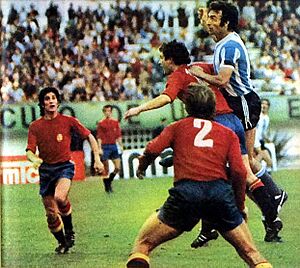
Spain qualified for the 1978 FIFA World Cup in Argentina. They had a tough time, losing to Austria and drawing with Brazil. They beat Sweden but were still eliminated from the group stage.
In 1980, Spain qualified for the European Championships for the first time since 1964. However, they were knocked out in the group stage.
In 1976, Spain was chosen to host the 1982 FIFA World Cup. This was the first World Cup with 24 teams. As the host nation, Spain had high hopes. They drew with Honduras, beat Yugoslavia, but then lost to Northern Ireland. These results were just enough to move to the second round. However, they lost to West Germany and drew with England, which meant they were knocked out.
Euro 1984 and 1986 World Cup
After the 1982 World Cup, Miguel Muñoz became the new coach. In the Euro 1984 qualifiers, Spain needed to beat Malta by at least 11 goals in their last match to qualify. They won an incredible game 12–1, scoring nine goals in the second half!
In the Euro 1984 tournament, Spain reached the final. They drew with Romania and Portugal, and then beat West Germany 1–0 to win their group. In the semi-finals, they beat Denmark in a penalty shootout. In the final, they lost 2–0 to the host country, France.
Spain qualified for the 1986 FIFA World Cup in Mexico. They beat Northern Ireland and Algeria to get out of their group. In the next round, they beat Denmark 5–1, with Emilio Butragueño scoring four goals. But in the quarter-finals, they lost to Belgium in a penalty shootout.
The 1990s: Ups and Downs
World Cups and Olympics
For the 1990 FIFA World Cup in Italy, Spain had a new coach, Luis Suárez. Spain played well in the group stage, drawing with Uruguay and winning against South Korea and Belgium. They won their group but then lost 2–1 to Yugoslavia in the Round of 16.
Spain didn't qualify for Euro 1992. However, the coach Vicente Miera led Spain to win the gold medal at the 1992 Olympics in Barcelona.
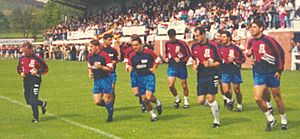
Javier Clemente became Spain's coach in 1992. Spain qualified for the 1994 FIFA World Cup in the United States. In the tournament, they drew with South Korea and Germany, then beat Bolivia to reach the second round. They beat Switzerland 3–0 but then lost a controversial quarter-final match 2–1 to Italy. During the game, a Spanish player, Luis Enrique, was elbowed in the face.
Euro 1996 and 1998 World Cup
Spain qualified for UEFA Euro 1996 in England. They drew their group matches against Bulgaria and France, and beat Romania. This sent them to the quarter-finals against host England. The game ended 0–0, and Spain lost in a penalty shootout.
In the 1998 FIFA World Cup, Spain was in a group with Nigeria, Paraguay, and Bulgaria. Their first game was a 3–2 loss to Nigeria, where Spain had led twice. They then drew 0–0 with Paraguay. Even though Spain won their last group game against Bulgaria 6–1, it wasn't enough. Paraguay beat Nigeria, so Spain was eliminated from the group stage.
The Golden Years Begin: 2000s
Euro 2000 and 2002 World Cup
After a surprising loss in the UEFA Euro 2000 qualifiers, José Antonio Camacho became coach. Spain won their remaining games to qualify. In the tournament, they lost to Norway but beat Slovenia and Yugoslavia. They then faced France, the 1998 World Cup champions, in the quarter-finals and lost 2–1.
Spain easily qualified for the 2002 FIFA World Cup. In the tournament, they won all three of their group matches. They beat Republic of Ireland on penalties in the second round. In the quarter-finals, they played against co-hosts South Korea. It was a very controversial match where Spain had two goals disallowed. They eventually lost in a penalty shootout.
Euro 2004 and 2006 World Cup
Spain struggled in UEFA Euro 2004 qualifiers and had to win a play-off to get into the tournament. In the main tournament, they beat Russia and drew with Greece, but failed to get the draw they needed against Portugal to move on. Luis Aragonés then became the new coach.
Spain qualified for the 2006 FIFA World Cup after a play-off. In the group stage, they won all their matches. However, they lost 3–1 to France in the second round. After this, Luis Aragonés decided the team needed to change its style of play. They started focusing on keeping the ball and passing it quickly, a style known as tiki-taka. This style involves short passes, lots of movement, and keeping possession of the ball.
Euro 2008 Triumph
Spain qualified for UEFA Euro 2008 by winning their group. In the tournament, they won all their group games, beating Russia, Sweden, and Greece.
In the quarter-finals, Spain played against Italy. The game ended 0–0, and Spain won the penalty shootout 4–2. They met Russia again in the semi-finals and beat them 3–0.
In the final, Spain defeated Germany 1–0, with Fernando Torres scoring the winning goal. This was Spain's first major title in 44 years! Spain was the top-scoring team, and David Villa was the top scorer with four goals. Xavi was named the best player of the tournament.
After Euro 2008, Luis Aragonés left, and Vicente del Bosque became the new manager. Spain continued their winning streak, setting new records for consecutive wins.
The 2010s: Continued Success and Challenges
2010 FIFA World Cup Champions
Spain qualified for the 2010 FIFA World Cup in South Africa with a perfect record of ten wins out of ten. They entered the tournament as one of the favorites.
In the group stage, Spain surprisingly lost their first game 0–1 to Switzerland. However, they bounced back, beating Honduras 2–0 (with two goals from David Villa) and Chile 2–1. They advanced to the knockout stage.
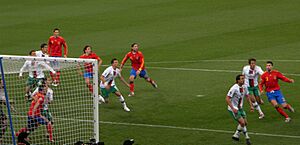
In the Round of 16, Spain defeated Portugal 1–0. They then beat Paraguay 1–0 in the quarter-finals, with another goal from David Villa. This was the first time Spain reached the semi-finals since 1950. In the semi-finals, they defeated Germany 1–0 with a header from Carles Puyol.
The final was against the Netherlands. In a very tough match, Andrés Iniesta scored the only goal in the last four minutes of extra time, winning the World Cup for Spain for the first time ever! Spain won the World Cup by scoring only eight goals and letting in just two, which is the lowest for any World Cup winner. They were also the first European team to win the World Cup outside of Europe.
Spain's team also won the FIFA Fair Play Award. Goalkeeper Iker Casillas won the Golden Glove award, and David Villa won the Bronze Ball and Silver Boot for his five goals.
UEFA Euro 2012 Champions
Spain continued their success by qualifying for UEFA Euro 2012 with a perfect record. They became the first team to win the European Championship twice in a row.
In the group stage, Spain drew 1–1 with Italy, then beat Republic of Ireland 4–0 (with two goals from Fernando Torres). Their last group game was a tough 1–0 win against Croatia, with Jesús Navas scoring late.
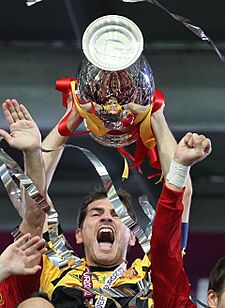
In the quarter-finals, Spain beat France 2–0, with both goals from Xabi Alonso. They then faced Portugal in the semi-finals. The game was 0–0 after extra time, and Spain won the penalty shootout.
In the final, Spain played Italy again and won an amazing 4–0! Goals came from David Silva, Jordi Alba, Fernando Torres, and Juan Mata. This win meant Spain had won three major tournaments in a row (Euro 2008, World Cup 2010, Euro 2012), a new record! They also became the joint most successful team in European Championship history with three titles.
2014 FIFA World Cup Disappointment
Spain went into the 2014 FIFA World Cup as one of the favorites. Their first match was a rematch of the 2010 final against the Netherlands. Spain took the lead, but the Netherlands played much better and won 5–1.
Needing to win their next game, Spain faced Chile. They lost 2–0, which meant they were knocked out of the World Cup in the group stage. This was a big surprise, as they were the defending champions. They did win their final group game against Australia 3–0.
UEFA Euro 2016 and 2018 FIFA World Cup
Spain qualified for UEFA Euro 2016 by winning their group. In the tournament, they beat Czech Republic and Turkey, but then surprisingly lost 2–1 to Croatia. This meant they finished second in their group. In the Round of 16, they lost 2–0 to Italy and were knocked out.
Spain qualified for the 2018 FIFA World Cup in Russia without losing a game. Just before the World Cup started, their coach Julen Lopetegui was replaced by Fernando Hierro. In their first match, Spain drew 3–3 with Portugal, with Cristiano Ronaldo scoring a hat-trick for Portugal. Spain won their next game against Iran 1–0. However, they were eliminated in the Round of 16 by host country Russia, losing in a penalty shootout after a 1–1 draw.
The 2020s: A New Chapter
UEFA Euro 2020 and Nations League
Spain qualified for UEFA Euro 2020 (played in 2021 due to the pandemic) without losing a game. In the group stage, they drew 0–0 with Sweden and 1–1 with Poland. They then won 5–0 against Slovakia, finishing second in their group.
In the Round of 16, Spain had a thrilling 5–3 win after extra time against Croatia. In the quarter-finals, they beat Switzerland 3–1 on penalties after a 1–1 draw. Spain reached the semi-finals, where they lost to Italy 4–2 on penalties after another 1–1 draw. Despite reaching the semi-finals, some fans and media criticized the team's performance.
Later in 2021, Spain reached the 2021 UEFA Nations League Final, but they lost 2–1 to France.
2022 World Cup
Spain started the 2022 FIFA World Cup with a big 7–0 win over Costa Rica. They then drew 1–1 against Germany but surprisingly lost 2–1 to Japan. This meant they finished second in their group. In the Round of 16, Spain lost to Morocco 3–0 in a penalty shootout after a 0–0 draw. This was their third major tournament elimination in a row by penalties.
Images for kids
-
Spain in a friendly match v. Argentina at River Plate, October 1974
-
Javier Clemente and the Spain team in a training session.
-
Austria lost to Spain by a score of 5–1 in November 2009 in Ernst-Happel-Stadion, Vienna
-
World Cup champions parade, celebrate as they pass in front of the Air Force Headquarters in Madrid.
-
Spain take a corner against Portugal in a Round of 16 match in the 2010 FIFA World Cup.
-
The captain Iker Casillas, lifting the Euro 2012 trophy.
Previous Squads
|
|


